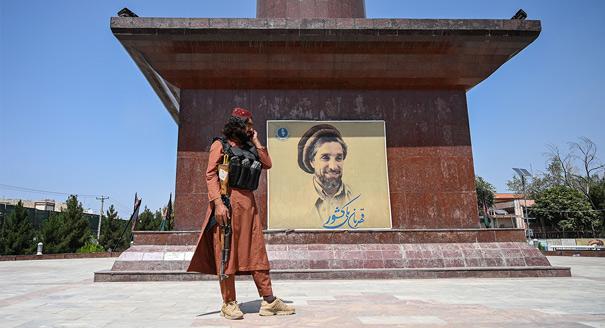The events currently unfolding in Afghanistan bear little resemblance to plans made ahead of the U.S. withdrawal, which was not supposed to be completed until August 31. The Afghan government under President Ashraf Ghani was at first expected to hang on for another six months, then—after the Taliban began their rout of the country’s cities—at least another one to three months. These were the forecasts being made not only in Washington, but in Moscow too. Just last week—days before the Taliban entered the capital Kabul—Russia’s presidential envoy to Afghanistan, Zamir Kabulov, was insisting that their seizure of the city of Kandahar was no indication that they could take control of the capital any time soon.
By the end of July, nearly all rural areas were under Taliban control, and it remained for the militants to capture several large cities: Kabul, Herat, Kandahar, and Mazar-e Sharif. On Saturday, all the forecasts went out the window when the Afghan army, trained to fight the Taliban until the bitter end, simply abandoned Mazar-e Sharif and headed for the border with Uzbekistan. It was all too reminiscent of the withdrawal of Soviet troops over the same bridge from Hairaton in Afghanistan to Termez in Uzbekistan back in 1989.
On August 15, the world watched scenes of desperate Afghans clinging to planes carrying foreign diplomats out of Kabul airport. In the meantime, the Taliban encircled Kabul and laid down their conditions to the Afghan government for a “peaceful transition of power.” The authorities promptly agreed, and President Ghani fled by plane to an unknown destination.
Meanwhile, Abdullah Abdullah, head of the High Council for National Reconciliation and effectively the country’s second-in-command, flew to Doha with Taliban representatives for talks on forming a new government.
The Taliban agreed to the talks, despite being one step away from victory, in order to take Kabul with no bloodshed: most likely because they wish to avoid scenes of violence being broadcast by the world’s media. They also took other measures to belie their dismal reputation. They offered security guarantees to all foreign embassies (going as far as to put the Russian embassy under armed guard), forbade their fighters from looting, promised amnesty to all those who had fought against them, and said they would not stop anyone from leaving the country.
It’s hard to make any predictions about the future of Afghanistan right now: there’s no authority in the country except the Taliban. But it’s telling that many leading representatives of the Afghan elite are rushing to integrate into the new political system.
Former president Hamid Karzai, High Council for National Reconciliation head Abdullah, and the Islamic Party leader Gulbuddin Hekmatyar have formed a council charged with overseeing the transition of power. There is no love lost between any of those men and the ousted president Ghani, and they have all previously met with the Taliban on more than one occasion, including in Moscow. Now they hope that the Taliban will employ their services to make their rule appear more civilized, and to accelerate international recognition.
Moscow had always had a complicated relationship with Ghani, so his departure did not come as a blow to the Kremlin. On the contrary, Russian embassy staff in Kabul told journalists that the Afghan president had fled “with cars full of money,” while Kabulov made it clear that the Taliban had long been considered easier to negotiate with by Moscow than the Afghan government.
For Russia, the formation of an interim government featuring other participants of the Moscow meetings would be one of the best possible outcomes. It would enable Moscow not to directly recognize the authority of the Taliban, which it has officially designated a terrorist organization, without burning its bridges with the militant group. It would also show that Russia’s diplomatic efforts on the eve of the U.S. withdrawal were highly effective.
Russia is not the only country to remain unperturbed by events unfolding in Afghanistan. Other regional neighbors—China, Iran, and Uzbekistan—all established contact with the Taliban long ago, and their diplomats are still working in the country right now, including in the cities that came under Taliban control before Kabul did.
A Chinese foreign ministry spokeswoman stated on August 16 that the Taliban has repeatedly said that they want to develop a good relationship with China and hope that Beijing will take part in the reconstruction and development of the nation. The group has also said it will never allow any forces to use the country to harm China, she added.
Russia, China, Iran, and Uzbekistan may have bet on the Taliban coming to power, but their current confidence in the Islamic militant group may well be short-lived. Nothing remotely resembling the “inclusive government” that the Taliban have promised is likely to appear, while drug trafficking and religious extremism will mushroom. But that doesn’t negate the fact that all the efforts of the United States and NATO to create a relatively stable state in Afghanistan fell apart in the space of just one week. And their global opponents can afford to gloat right now, because even the most obvious problem—that of refugees—isn’t yet fully apparent: Afghanistan’s land borders are controlled by the Taliban, and for now, people quite simply do not dare to try their luck at the checkpoints.
